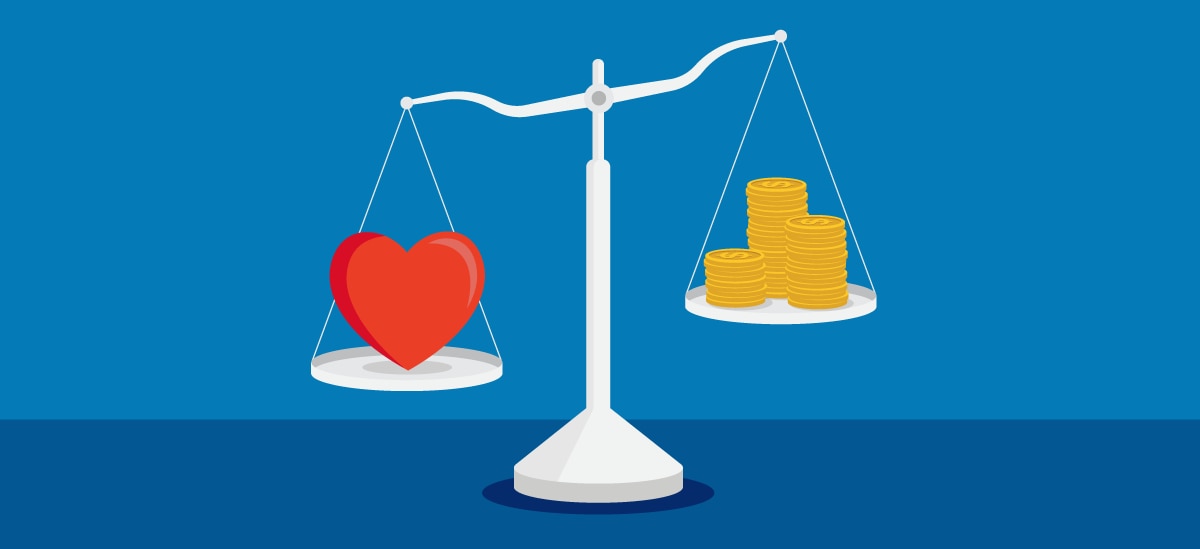
Finding love (or even like) isn't always easy. A good match for you might clear those initial relationship hurdles, but you could eventually hit a snag if your money personalities turn out to be anything but a perfect match.
There are some things you might agree on when it comes to finances. For example, one survey found that overspending and being secretive about money were top financial deal breakers for couples in every state.1
But you may not always be in perfect harmony financially, which could set the stage for money arguments down the track. Finding ways to bring your differing views on money together can be the key to making your relationship work.
How your money personality affects your financial health
"Everyone has their own beliefs, habits, and experiences surrounding money, which starts from childhood and continues into adulthood. These collective experiences and beliefs are what shape your internal scripts and behavior surrounding money", says money coach, Carrie Friedberg.
"We all had money flashpoints as children, whether positive, negative, or neutral," Friedberg says, which contributes to your overall money personality. And in turn, your money personality is what influences how you manage things like budgeting, spending, credit, and debt.
Here are some of the most common money personality types:

- Spenders. Spenders enjoy spending money on themselves and others. They tend to do so freely and sometimes impulsively.
- Savers. Savers are careful with their money and believe in the importance of cutting costs and setting aside money for a rainy day. Money hoarders are an extreme example of savers; they're ultra-thrifty and live to save.
- Amassers. Amassers are a little different from savers. They like to save money, but they also look at the bigger picture, such as building wealth and financial security for the long-term.
- Avoiders. Money avoiders take hands-off to a new level. They don't want to think about money, talk about it, or be hands-on with managing it.
Do you spot yourself or your significant other on the list? If so, then you've already tackled the hard part, which is identifying a potential money mismatch.
Friedberg says that in her case, her husband is an Avoider when it comes to talking about or managing money while she's very hands-on. Those different personalities have directly influenced the division of labor, in terms of how they manage their finances.
Their current system has Friedberg taking responsibility for paying bills and guiding their financial plan while sitting down with her husband a few times a year to make sure he's satisfied with the direction they're taking. If you have a money personality mismatch, it's important to find a system that allows your different viewpoints to come together in harmony as well.
Pros and cons of dating your financial opposite

Being in a relationship with someone who doesn't view money the same way as you do has its advantages and disadvantages.
On the pro side, dating (or being married to) someone with an opposite money personality can give you insight into a different financial perspective. If you're the spender in the relationship, for example, dating a saver could expose you to positive money beliefs and habits that you may not have experienced growing up. Or, if you're the saver, you could be the one to set a positive money example for your spender partner.
The downside, of course, is that money can become a source of disagreement between the two of you. For instance, you may each have certain money deal breakers that could make the relationship a no-go. That might include things like:
- Being in debt
- Having a poor credit score
- Lying about or hiding money
- Being unwilling to discuss money
If you're an Amasser who's focused on financial security and increasing your net worth, for example, you might be frustrated by a partner or spouse who's an Avoider and takes a head-in-the-sand approach to money.
Friedberg says that her money deal breakers include avoiding credit card debt and making sure the bills are always paid on time. But since her husband prefers not to get bogged down in the details, it's largely left up to her to make sure they aren't breaking their own financial rules.
"It can be a little lonely at times and I do have to keep resentments in check, but for the most part we both have what we want," she says.
How to keep money differences from hurting your relationship

Not being in 100% agreement over money doesn't mean that you can't have a happy relationship, but you may need to work a little harder to achieve it.
With that in mind, here are some tips for managing your finances as a couple, even when your money personalities aren't identical.
- Accept your differences. While you don't have to necessarily accept bad financial behavior, such as being secretive about money, you do have to accept that you and your partner are two different people, with two different money viewpoints.
- Communicate. Without a doubt, communication is key to making a relationship work when you're not on the same page about money. Both of you should feel comfortable communicating with the other what you feel about money and how to manage it in the relationship. Talking regularly about money can help you both understand where the other person is coming from and what's driving their money beliefs.
- Be respectful of your partner's financial goals and priorities. Respect is essential to any relationship, even when money isn't a concern. Being respectful, rather than pointing fingers or lecturing, can help keep the lines of communication open so you can continue working on improving your financial picture together.
- Create boundaries. When you don't take the same approach with money, there needs to be some ground rules for managing it. For example, you may decide to keep your bank accounts separate rather than mingling money. Or you may set up one joint account to which you both contribute an agreed-upon amount for your shared bills. Having boundaries you're both comfortable with can reduce the odds of running into money disagreements.
- Keep it fair. If you're sharing expenses as a couple, make sure that you're doing so fairly. For example, if one of you makes significantly more money, then instead of splitting expenses 50/50, you might agree to split them based on how much you each make.
Lastly, another important thing to keep in mind if you're the polar opposite of your partner when it comes to money is to keep it friendly, Friedberg says. "A successful couple learns how to navigate these differences, with professional help if needed, and let go of trying to change the other."
Need help setting up accounts for shared and individual expenses? Consider talking to a PNC banking specialist about solutions that can help you manage your money as a couple more effectively.




